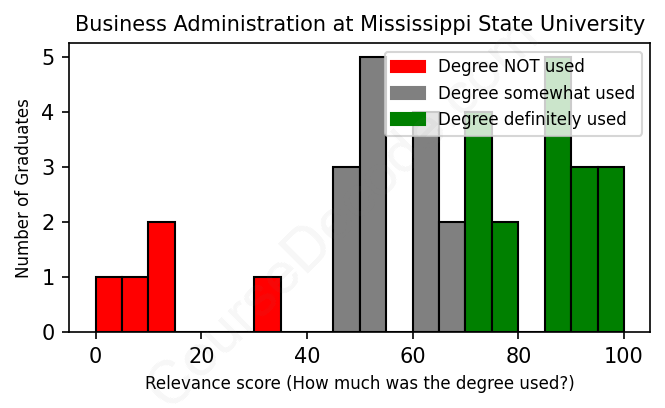
First, some facts. Of the Business Administration graduates from Mississippi State University we've analyzed , here's how many have used (or NOT used) their degree in their career:

These are estimates based on AI analysis of 36 LinkedIn profiles (see below).
The verdict? Slightly below average. Overall, with an average relevance score of 63%, Business Administration graduates from Mississippi State University have a slightly lower likelihood (-4%) of finding work in this field compared to the average graduate across all fields:
And for comparison, here's the chart for all profiles we've looked at across all degrees.
Also, after graduating, only 19% of these graduates have pursued further education other than another Bachelor's degree (such as a Masters degree or other), compared to the average across all profiles of 35%. This suggests a Bachelors degree is enough for most Business Administration graduates, and it's normal to look for work straight after graduation.
See the details:
|
Relevance score: 50% We think this person has gone into a career only somewhat relevant to their degree. We think this person has gone into a career only somewhat relevant to their degree.
DEGREE INFOGraduated in 2017 from Mississippi State University with a Bachelor's degree in Business Administration. No other secondary education since. JOB HISTORY SINCE GRADUATIONAssistant Manager Cock Of The Walk Restaurant May 2017 - Dec 2019 ABOUTNo information provided. |
The top 10 most common jobs done by the graduates we've analyzed (ranked most common to least) are:
Based on the job profiles of individuals who graduated with a Business Administration degree from Mississippi State University, it seems like there are a variety of roles that alumni have taken on across different industries. Many of the common positions are in management, sales, and operations. For example, roles like Section Manager at Caterpillar and the Director of Operations at various organizations show a clear engagement with the principles of business administration. Positions related to production control at Toyota and other manufacturing firms reflect a reliance on organizational skills, although these roles may not be solely rooted in business management. There are also those who ended up in roles that have minimal connection to core business concepts, like IT Support or as Dog Trainers, which are more focused on specific skills outside of the business realm.
Overall, while some jobs are indeed relevant to business administration, a significant number of the roles, especially in areas like non-profits, coaching, and certain technical positions, don't fully leverage the core competencies of a business degree. Consequently, graduates might find that their specific job in the workforce may only partially align with their degree's teachings. However, leadership, management, and strategic positions are prevalent enough to suggest that business administration skills have relevance in various fields, particularly where overseeing teams and utilizing operational efficiency come into play. It’s a mixed bag, but with many opportunities that connect back to what they learned during their time in college.
Here is a visual representation of the most common words in job titles for Business Administration graduates (this is across all Business Administration graduates we've analyzed, not just those who went to Mississippi State University):

Graduates from the Business Administration program at Mississippi State University tend to have diverse career trajectories, often starting their professional journeys in entry-level positions that help them build relevant skills and experience. For example, many graduates land roles as production control specialists, financial analysts, or sales managers right after completing their degrees. These first jobs often serve as stepping stones, leading them to more senior and specialized positions in industries like manufacturing, finance, and human resources. It's clear that the foundational skills gained during their time at university, such as project management, analysis, and leadership, are being applied effectively in the workforce.
Looking a bit further down the line, around five to ten years post-graduation, many alumni seem to have moved into managerial roles or even into business ownership. For instance, it's not uncommon to see graduates transition from a role like production supervisor or human resources generalist to positions such as human resources manager or program manager. Some have even taken the leap to establish their own businesses! Others have carved out notable paths in specific sectors, like a graduate from 2012 who became a Program Manager after starting as a General Accountant. Overall, while there's a sprinkle of less traditional career paths out there, many graduates appear to be building successful and relevant careers in fields aligned with their degree, showcasing the versatility and value of a Business Administration education from Mississippi State University.
Getting a Bachelor’s degree in Business Administration can be a mixed bag; it really depends on your interests and strengths. At schools like Mississippi State University, you’ll typically cover a range of subjects like marketing, finance, and management, which can be pretty manageable if you enjoy those areas. Generally, it’s considered to be about average in terms of difficulty. Some people find the coursework engaging and the assignments straightforward, while others might struggle with things like accounting or quantitative analysis. If you stay organized and keep up with the readings, you should be able to handle it without too much stress!
Most commonly, in the LinkedIn profiles we've looked at, it takes people 4 years to finish a Bachelor degree in Business Administration.
Looking at the career paths of these Mississippi State University Business Administration grads, it seems like many of them have been pretty successful in their jobs, which usually translates to decent earnings. Some have moved up the corporate ladder, like those at Toyota and Caterpillar, landing managerial positions which often come with a good salary. Others have ventured into entrepreneurship or specialized roles in fields like finance or operations, which can be lucrative too. Of course, there are a few more entry-level or support roles, especially in the early stages, but overall, it looks like these folks are on a promising career track where they're likely making decent money over time. So, if you're thinking about business, it seems like a solid route with plenty of opportunities!
Here is a visual representation of the most common words seen in the "about" section of LinkedIn profiles who have a Bachelor degree in Business Administration (this is across all Business Administration graduates we've analyzed, not just those who went to Mississippi State University). This may or may not be useful:

Here are all colleges offering a Bachelor degree in Business Administration (ordered by the average relevance score of their Business Administration graduates, best to worst) where we have analyzed at least 10 of their graduates: